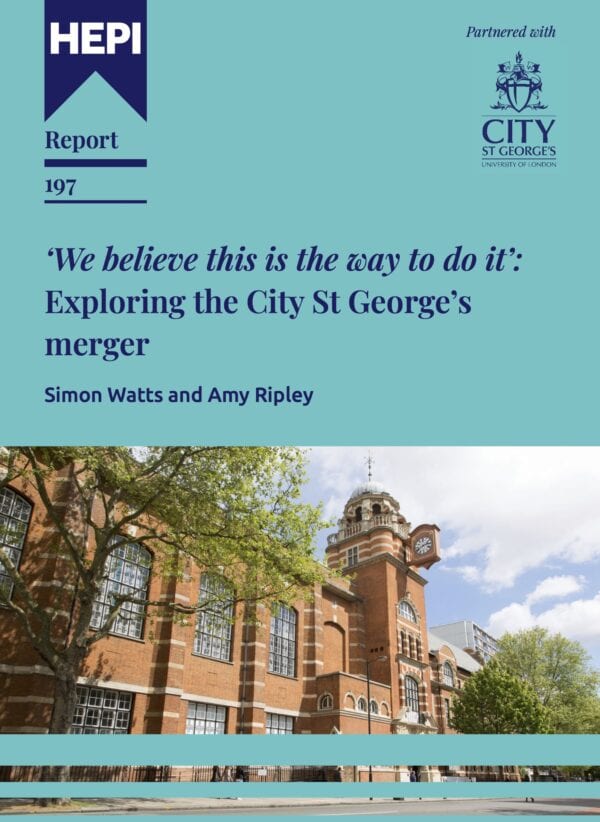Outgoing Student Support Champion outlines 10 trends likely to change higher education in the coming years
Find out about HEPI’s forthcoming events, including our upcoming webinar on service-learning programmes in policy and practice and the 2025 HEPI Annual Conference here.
In a report to mark the end of his tenure as the Government’s Higher Education Student Support Champion, Professor Edward Peck has laid out his thoughts on the future of higher education in a new Policy Note published by the Higher Education Policy Institute.
The paper, The future of the campus university: 10 trends that will change higher education by Professor Edward Peck, Ben McCarthy (Student Support Champion Project Manager) and Jenny Shaw (Student Support Champion Consultant) offers prompts for productive discussion and innovation in the sector at a challenging time.
While not attempting to predict the future, the Policy Note draws on current trends to set out a series of discussion points on the future of the campus university. In a world of generative artificial intelligence (AI) and rapid social change, the report explores the potential for student support and personal development to be the foremost areas of value for students, ensuring graduates are prepared for the modern workforce and society.
The report’s introduction states:
‘what have in the past been viewed as support, co-curricular or extra-curricular activities will move into the mainstream of the student experience as core aspects of the value of a degree. Academic awards will focus as much on the development of employment and generic skills as the acquisition and retention of specific knowledge. This could sustain, and perhaps increase, the appetite for the face-to-face engagement that has been the distinctive feature of higher education for over a thousand years.’
Key discussion points in the paper include:
- The ongoing impact of tuition fees
‘With hindsight, perhaps 2012 constituted the moment the sector had the opportunity to embrace a customer service ethos wholeheartedly, because that was what students, their parents and the commentariat would come to expect from this model and level of funding.’
- The change in focus for the curriculum due to generative AI
‘Developments in this technology will lead to personalised learning and customised assessment for each student. … It will move [academics] more towards creating curricula that prioritise higher order thinking skills, such as complex analysis, real-world application and critical thinking.’
- The opportunity for students to develop skills within a campus community
‘campus universities will have to find ways to maintain and to demonstrate the benefits of some traditional methods of learning. They will need to demonstrate to students that essential skills to thrive in an AI world are best learned face-to-face.’
- Stronger regionality in undergraduate choices and the benefits this could bring
‘a greater proportion of students coming to campus from regional schools and colleges could help to embed general pre-enrolment activities as part of a structured transition to a specific university, much as the preparation for the move from primary to secondary education is planned. Such arrangements could also open up the possibility of much greater sharing of information between 16-19 education and higher education that will enable, with the students’ and agencies’ consent, much more individualised approaches to pre-arrival and on-campus induction activities.’
- The potential of technology in student support
‘Generative AI will not replace the roles of specialist student support staff. … Nevertheless, it will have a major role to play in recognising students who are vulnerable or in distress, in some areas responding to these needs.’
The paper concludes that regulation designed to promote the interests of students will naturally provide further impetus for these changes within the sector. It suggests that future regulation which addresses the needs of stakeholders ‘will require higher education providers to pay due attention to the effective implementation of interventions that maximise student benefit and minimise the potential for harm.’
Nick Hillman, the Director of HEPI, said:
‘It is an honour for HEPI to be publishing the thoughts of Professor Peck, given his long-standing leadership in the university sector.
‘University managers and governors across the UK and beyond are likely to value this timely piece on how campus universities could change because it informs, challenges and provokes in very useful ways.’
Notes for editors
- Professor Edward Peck is Vice-Chancellor and President of Nottingham Trent University and Interim Chair of UCAS. He is a former Board member of both UUK and the Universities and Colleges Employers Association (UCEA). He was also a member of the panel of the UK Government’s Post-18 Fees and Funding Review, better known as the Augar review. In May 2022 he was appointed as the Department for Education’s Higher Education Student Support Champion and became Chair of the Higher Education Mental Health Implementation Taskforce in June 2023. He will step down from all these roles by early July 2025 when he will become the Chair of the Office for Students.
- HEPI was established in 2002 to influence the higher education debate with evidence. We are UK-wide, independent and non-partisan. We are funded by organisations and higher education institutions that wish to support vibrant policy discussions, as well as through our own events. HEPI is a company limited by guarantee and a registered charity.







Comments
Add comment